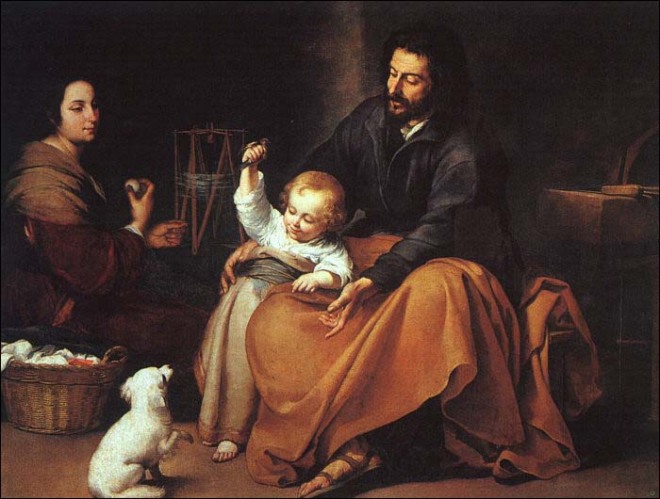“The Christian family is a communion of persons, a sign and image of the communion of the Father and the Son in the Holy Spirit. In the procreation and education of children, it reflects the Father’s work of creation. It is called to partake of the prayer and sacrifice of Christ. Daily prayer and the reading of the Word of God strengthen it in charity. The Christian family has an evangelizing and missionary task.” (CCC 2205)
Jesus spent most of his life hidden living within the context of a family. Today is the Feast of the Holy Family and the lives of Jesus, Mary and Joseph provide us with some important lessons. Their home life at Nazareth is in many ways a school, as Pope Paul VI pointed out in his address on 5 January 1964.
The home of “Nazareth is the school in which we begin to understand the life of Jesus. It is the school of the Gospel.” The first lesson is of silence where “we learn to observe, to listen, to meditate, and to penetrate the profound mysterious meaning” of Jesus and to imitate Him. Silence is an admirable and indispensable condition of mind to revive in us as it teaches “us recollection, reflection, and eagerness to heed the good inspirations and words of true teachers”.
The home at Nazareth teaches a lesson on family life. The Holy Family teaches us what family life is – a communion of love with “its simplicity and austere beauty, its sacred and inviolable character.” When meditating on the life of the Holy Family we cannot help but think about how there is something ordinary about this family. They are living out their daily lives doing everyday things together. They eat meals together, pray and work together, and sometimes they even travel. So much of this is reminiscent of our own family life, doing unremarkable things together day in and day out, even taking a trip once in a while.
On one such trip, the Holy Family notices that Jesus is missing, and the parents go in search of Him. For three days Joseph and Mary went searching for Jesus. Sometimes our life’s present circumstances are buried in endless activities and filled with various worries and sometimes, like with the Holy Family, with great challenges! Mary was afraid that her Son had disappeared. Overwhelmed with anxiety, she and Joseph continued their search with the hope that they would be reunited with Him again. Then they experienced such joy at finding Jesus! Once they found Him, they returned to their home in Nazareth to resume their lives and daily living with Jesus.
Additionally, we receive the lesson of work from the home at Nazareth where the “carpenter’s Son” shows us how to “understand and to praise the austere and redeeming law of human labor.” The life of this holy family was unseen and filled with love and work.
During these hidden years, the whole family lived the hidden human virtues we are all called to live. Simple, humble virtues like work, religion, family life, and activities. These virtues are ways to sanctify our daily lives. There is nothing great here, just ordinary things done daily and lived authentically.
Entrustment and Consecration of Families to the Holy Family
Dear Holy Family, Jesus, Mary and Joseph,
We are orphans in a world grown cold, and we are seeking the Refuge of your Holy Home at Nazareth.
Holy Family, take us in our Heart as we entrust, and consecrated our family, and all families, entirely to you. Infuse in our hearts the same love for each other that penetrated the Heart of the Holy Family.
St. Joseph, we beg you to be the father of our family. Please guide, protect, and provide for us as you did the Holy Family.
Holy Mary, please be our Mother! Teach us, take care of us, and love and embrace us in your Maternal Heart as you did your family.
Jesus, be our Brother and our King. Be the center of our lives. Let your Sacred Heart and the Heart of the Holy Family reign in our homes.
Teach us how to pray together, work together, play together, and become saints together – with God and family as our first priority!
Teach us to praise and encourage one another and to be faithful, chaste and committed.
Comfort us in our sufferings, and dry away every tear of us who are in distress caused by the difficulties, heartaches, and sorrows of our families.
After you have raised us as your very own children, send us out as you did Jesus.
Send us to minister to the poor, the sick, the suffering, the aged, the lonely, the prisoners, and to defend and protect LIFE and the concerns of Holy Mother Church.
Send us, no matter in what walk of life we may be in, to make a difference in this world. Let us be so filled with charity that the cross will no longer be a burden because we will be following Him, our Brother, who gave His life for us. Let us do the same for each other. Amen.


